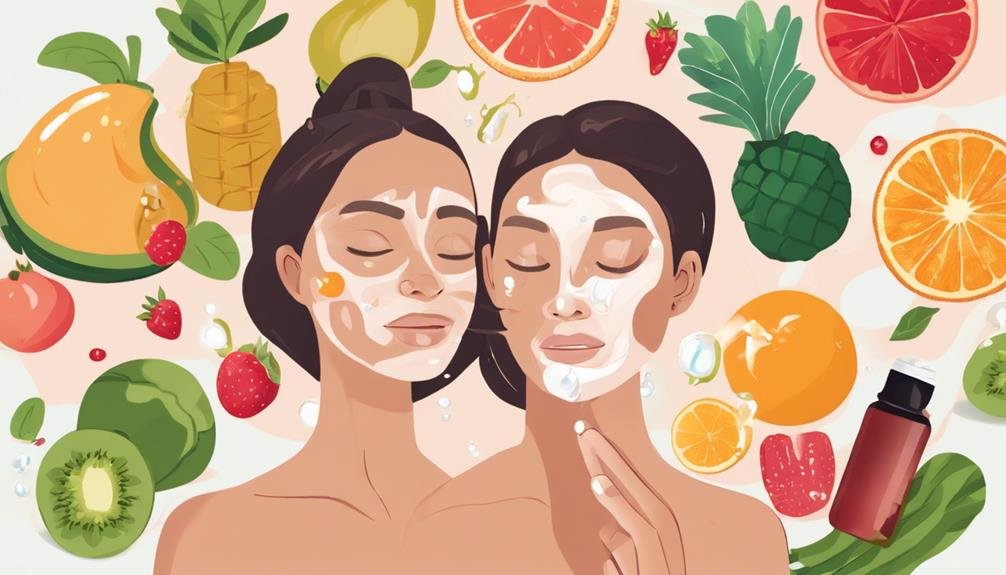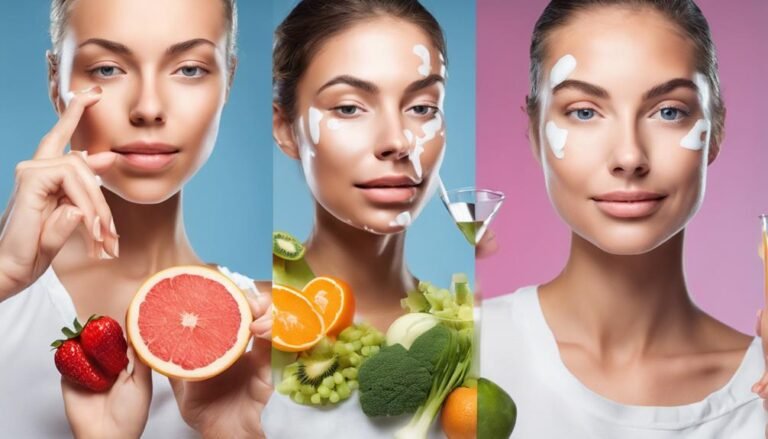Healthy Body, Healthy Skin Connection
You may have heard that achieving healthy skin goes beyond just skincare products, and you're absolutely right. The link between your body's overall health and the condition of your skin is intricate and worth exploring. Understanding how your lifestyle choices impact your skin can lead to significant improvements in its appearance and health. So, how exactly does what you eat, how you move, and the way you rest affect your skin? Let's uncover the fascinating connection between a healthy body and radiant skin.
Key Takeaways
- Balanced diet supports skin health with essential nutrients.
- Regular exercise boosts blood flow and collagen production for skin.
- Quality sleep aids skin repair and moisture balance.
- Stress management reduces inflammation and supports skin health.
- Hydration and skincare routine are crucial for healthy skin.
Importance of Skin Health

The skin is the body's largest organ, serving as a crucial protective barrier against external threats such as pathogens, UV radiation, and environmental pollutants. It plays a vital role in maintaining homeostasis by regulating body temperature, preventing dehydration, and acting as a sensory organ. Skin health is essential not only for physical well-being but also for psychological and emotional health. Healthy skin is a reflection of overall well-being, and its condition can impact self-esteem and confidence levels.
Maintaining good skin health involves proper hydration, a balanced diet rich in vitamins and antioxidants, regular cleansing, and protection from sun exposure. Neglecting skin care can lead to various issues such as dryness, irritation, acne, premature aging, and even skin diseases.
It's important to establish a skincare routine tailored to your skin type and specific needs. Consulting with a dermatologist can provide valuable insights and guidance on how to best care for your skin to keep it healthy and vibrant.
Role of Nutrition
Optimizing your nutrition plays a fundamental role in promoting healthy skin. Your skin is a reflection of your internal health, and feeding it with the right nutrients can make a significant difference in its appearance and function. A balanced diet rich in essential vitamins, minerals, and antioxidants is key to maintaining healthy skin.
Role of Nutrition in Skin Health
| Nutrient | Role in Skin Health | Food Sources |
|---|---|---|
| Vitamin C | Collagen synthesis | Citrus fruits, peppers |
| Vitamin E | UV protection | Nuts, seeds, spinach |
| Omega-3 Fatty Acids | Maintain skin barrier | Fatty fish, flaxseeds |
These nutrients help in collagen synthesis, providing UV protection, and maintaining the skin barrier. Incorporating a variety of colorful fruits and vegetables, lean proteins, and healthy fats into your diet can have a positive impact on your skin. Remember, what you eat can directly affect the health and appearance of your skin.
Hydration for Skin

Maintaining adequate hydration levels is crucial for healthy skin. Your skin is the largest organ in your body and relies on proper hydration to function optimally. When you're dehydrated, your skin can appear dry, tight, and more prone to wrinkles. Hydrated skin, on the other hand, is plump, vibrant, and has a healthy glow.
Water is essential for maintaining skin elasticity and firmness. It helps to flush out toxins, regulate body temperature, and deliver essential nutrients to skin cells. Drinking enough water throughout the day is key to keeping your skin hydrated from the inside out.
Additionally, using moisturizers with hydrating ingredients like hyaluronic acid can help lock in moisture and improve skin barrier function.
Incorporating hydrating foods into your diet, such as fruits and vegetables with high water content, can also contribute to healthy skin. Remember, staying hydrated not only benefits your skin but also supports overall well-being. So, grab that water bottle and give your skin the hydration it deserves.
Exercise Benefits
Hydration plays a significant role in maintaining healthy skin, but another key factor that influences skin health is regular exercise. Engaging in physical activity not only benefits your overall health but also has specific advantages for your skin. When you exercise, your skin's blood flow increases, delivering more oxygen and nutrients to your skin cells. This enhanced circulation helps in the removal of toxins and waste products, promoting a clearer complexion and healthier skin tone.
—
| Exercise Benefits for Skin | ||||
|---|---|---|---|---|
| Increases blood flow to the skin | Helps in the removal of toxins | Promotes a clearer complexion | Enhances skin tone | Boosts collagen production |
Regular exercise also boosts collagen production, which is essential for skin elasticity and firmness. Furthermore, sweating during exercise can help unclog pores and prevent acne. Aim for a combination of cardio and strength training exercises to maximize the benefits for your skin. So, next time you break a sweat, know that you are not just working on your fitness but also nurturing your skin from within.
Impact of Sleep

Getting an adequate amount of quality sleep each night is crucial for maintaining optimal skin health. During deep sleep, the body enters repair mode, producing collagen that helps prevent sagging and fine lines. Sleep deprivation can lead to increased cortisol levels, a stress hormone that breaks down collagen, resulting in dull skin and wrinkles. Lack of sleep also disrupts the skin's natural moisture balance, leading to dryness and potential skin conditions.
Furthermore, insufficient sleep can contribute to inflammation, exacerbating skin conditions such as acne, eczema, and psoriasis. Research shows that individuals who consistently get 7-9 hours of quality sleep exhibit healthier skin with improved elasticity and fewer signs of aging. To promote skin health through sleep, establish a consistent bedtime routine, limit screen time before bed, and create a relaxing sleep environment.
Prioritizing quality sleep not only enhances skin health but also contributes to overall well-being. Aim to prioritize sleep as a crucial component of your skincare routine for glowing, radiant skin.
Stress Management
As we've discussed the impact of sleep on skin health, it's important to recognize another significant factor: stress management. Research suggests that high levels of stress can negatively affect your skin. During times of stress, the body releases cortisol, a hormone that can lead to increased oil production, inflammation, and breakouts. Furthermore, stress can impair the skin's ability to repair itself, leading to a dull complexion and premature aging.
To effectively manage stress for healthier skin, consider incorporating relaxation techniques into your daily routine. Practices such as meditation, deep breathing exercises, yoga, and spending time in nature have been shown to reduce stress levels and improve skin health.
Additionally, engaging in regular physical activity can help combat stress and promote overall well-being.
Skincare Routine Basics

To maintain healthy skin, establishing a consistent skincare routine is essential. Your skin is a reflection of your overall health, and taking care of it through a daily regimen can help you achieve a radiant complexion.
Here are some skincare routine basics to get you started:
- Cleansing: Gentle cleansing is crucial to remove dirt, oil, and impurities that can clog pores and lead to breakouts. Choose a cleanser suited to your skin type – whether oily, dry, or combination – and wash your face twice a day.
- Moisturizing: Hydrating your skin is key to maintaining its elasticity and smoothness. Apply a moisturizer that matches your skin's needs after cleansing to lock in moisture and prevent dryness.
- Sunscreen: Protecting your skin from harmful UV rays is vital in preventing premature aging and skin damage. Use a broad-spectrum sunscreen with at least SPF 30 daily, even on cloudy days.
Sun Protection Tips
Proper sun protection is crucial for maintaining healthy skin and preventing sun damage. When it comes to shielding your skin from harmful UV rays, there are a few key tips to keep in mind.
Firstly, always apply a broad-spectrum sunscreen with an SPF of 30 or higher, even on cloudy days. Reapply every two hours, especially if you're swimming or sweating.
Wearing protective clothing, such as wide-brimmed hats and sunglasses, can also offer additional defense against the sun's rays. Seek shade during peak sun hours, typically between 10 a.m. and 4 p.m., when UV rays are strongest.
Remember to protect often overlooked areas like your ears, neck, and hands. Lastly, be mindful of reflective surfaces like water, sand, and snow, as they can increase UV exposure.
Avoiding Harmful Habits

Amidst the quest for healthy skin, one crucial aspect to consider is avoiding harmful habits that can undermine your skin's well-being. While skincare products play a role in maintaining skin health, your daily habits can significantly impact your skin's appearance and vitality. Here are some harmful habits to steer clear of:
- Smoking: Smoking not only affects your overall health but also damages your skin. It accelerates the aging process, leading to wrinkles, fine lines, and a dull complexion.
- Excessive Alcohol Consumption: Alcohol dehydrates the skin, making it look dry and dull. It also dilates blood vessels, causing redness and exacerbating conditions like rosacea.
- Poor Diet: Eating a diet high in processed foods, sugar, and unhealthy fats can contribute to skin issues like acne and inflammation. Opt for a balanced diet rich in fruits, vegetables, and lean proteins to nourish your skin from within.
Holistic Approaches
Considering the intricate relationship between your habits and skin health, exploring holistic approaches becomes imperative for achieving optimal skin vitality.
Holistic approaches focus on addressing the root causes of skin issues by considering the interconnectedness of the body's systems. This approach emphasizes the importance of a balanced diet rich in antioxidants, vitamins, and minerals to support skin health from within.
Regular exercise helps improve circulation, which in turn promotes healthy skin cell turnover and regeneration. Adequate hydration is essential for maintaining skin elasticity and overall health.
Stress management techniques such as meditation, yoga, or deep breathing exercises can help reduce inflammation and prevent skin conditions exacerbated by stress. Additionally, getting enough quality sleep is crucial for skin repair and rejuvenation.
Professional Skincare Treatments

Numerous professional skincare treatments are available to address specific skin concerns and enhance overall skin health. These treatments are designed to provide targeted solutions for various skin issues, helping you achieve a clear and radiant complexion.
Here are some popular professional skincare treatments to consider:
- Chemical Peels: A chemical solution is applied to the skin to exfoliate and remove dead skin cells, revealing smoother and more even-toned skin.
- Microdermabrasion: This non-invasive procedure uses a diamond-tipped tool to gently exfoliate the skin, improving texture and promoting cell turnover.
- Laser Therapy: Laser treatments target specific skin concerns such as acne scars, sun damage, and fine lines by stimulating collagen production and skin rejuvenation.
Professional skincare treatments can complement your daily skincare routine and provide noticeable results. Consult with a skincare professional to determine the best treatment options for your skin type and concerns.
Sustainable Practices
As you explore ways to maintain healthy and radiant skin, it's important to consider the impact of sustainable practices on both your skin health and the environment. Sustainable skincare practices not only benefit your skin but also contribute to a healthier planet by reducing waste and minimizing harmful chemicals. By making conscious choices in your skincare routine, you can promote both personal well-being and environmental sustainability.
| Benefits of Sustainable Skincare Practices | |
|---|---|
| 1. Reduced exposure to toxins | 2. Support for eco-friendly brands |
| 3. Preservation of natural resources | 4. Contribution to waste reduction |
| 5. Promotion of ethical production methods |
Choosing skincare products with natural and organic ingredients, opting for minimal packaging, and supporting companies with eco-friendly initiatives are simple yet impactful ways to integrate sustainability into your skincare regimen. By prioritizing sustainable practices, you not only nurture your skin but also help preserve the beauty of our planet for future generations.
Frequently Asked Questions
Can Genetics Play a Role in Skin Health?
Yes, genetics can significantly influence your skin health. Your DNA dictates traits like skin type, pigmentation, and susceptibility to conditions. Understanding your genetic predispositions can help tailor your skincare routine to best support your skin.
How Does Pollution Affect Skin Condition?
You asked about pollution's effects on skin. To put it simply, pollution can lead to skin issues like premature aging and dullness due to free radicals and toxins. Protecting your skin is vital.
Is There a Link Between Mental Health and Skin Issues?
Yes, there is a known link between mental health and skin issues. Stress and anxiety can exacerbate skin conditions like acne, eczema, and psoriasis. Practicing self-care, managing stress, and seeking support can help improve skin health.
Can Hormonal Changes Impact Skin Health?
When hormonal changes occur, your skin can be affected. Increased sebum production during puberty or hormonal fluctuations during menstruation can lead to breakouts. Maintaining a balanced hormone level through diet and lifestyle choices can help improve skin health.
What Role Do Allergies Play in Skin Reactions?
Allergies can trigger various skin reactions. Your body's immune response to allergens can result in itching, redness, swelling, or rashes. Identifying and avoiding allergens, along with proper skincare, can help manage and prevent these skin reactions effectively.
Conclusion
In conclusion, maintaining a healthy body is essential for achieving healthy skin. Did you know that up to 80% of premature skin aging is caused by environmental factors such as sun exposure and pollution? By prioritizing nutrition, hydration, exercise, sleep, and avoiding harmful habits, you can support your skin's natural functions and promote a radiant complexion. Remember, taking a holistic approach to skincare is key to achieving long-lasting results.








